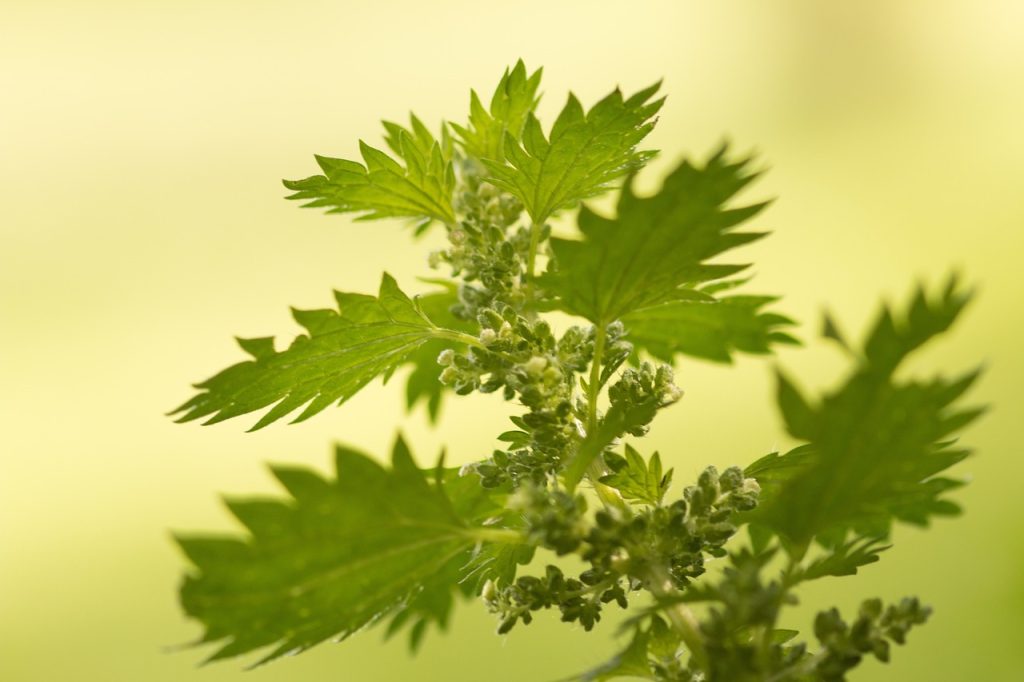
You are strolling across a field at your countryside and your leg brushes on a plant while you suddenly feel a painful sting! Nettle is often found flourishing in wild fields and gardens, it may seem like a common weed, but the medicinal properties and protection from allergies that this prickly plant offers might just make up for its sting.
The History of Nettle in Herbal Medicine
Nettle has been frequently mentioned throughout traditional medicine systems for centuries. Known for its ability to support overall health and vitality, this unassuming plant has played a crucial role in herbal treatments worldwide.
The use of nettle can be traced back to the Greeks and Romans, who believed in its therapeutic properties. Historical texts like Dioscorides’ “De Materia Medica” praised nettle for its diverse applications that ranged from arthritis treatments to healthier skin. Across Europe, nettle has been a staple in folk medicine, recognized for its nutrient-dense leaves and roots where it stood as a symbol of strength and protection largely attributed to its defensive stinging hairs.
In contemporary times, scientific research has begun to validate the traditional uses of nettle. Studies highlight its rich nutritional profile, anti-inflammatory effects, and potential to alleviate symptoms of various conditions. The growing body of evidence underscores the ancient and enduring wisdom of herbal practices.
In this article, we delve deeper into the scientific literature and explore how nettle you can integrate nettle into your own healthy lifestyle.
A Versatile Herb with Remarkable Benefits
Nettle offers a range of unique benefits, standing out among herbs for its versatility and effectiveness. Below, we outline some of the scientifically supported health advantages of nettle:
Nutrient-Rich Superfood: Nettle is packed with vitamins and minerals, including vitamin A, C, K, and B-complex, as well as calcium, iron, and magnesium. This nutrient density makes it an excellent addition to a balanced diet, promoting overall health and vitality.
Anti-Inflammatory Properties: One of nettle’s most celebrated benefits is its ability to reduce inflammation. Compounds in nettle help inhibit pro-inflammatory pathways, making it effective for conditions like arthritis and other inflammatory disorders.
Allergy Relief: Nettle has natural antihistamine properties, making it a popular remedy for managing hay fever and seasonal allergies. It can help reduce symptoms such as sneezing, itching, and nasal congestion.
Urinary Health Support: Nettle is often used for support urinary tract health. It acts as a diuretic, helping to flush out toxins and prevent urinary issues. It is also beneficial for managing benign prostatic hyperplasia (BPH) in men.
Skin Health: Topical applications of nettle can help with skin conditions such as eczema and acne. Its anti-inflammatory and antimicrobial properties make it a valuable herb for maintaining healthy skin.
How to Take Nettle
Integrating nettle into your routine can be simple and effective. Here are some popular methods to enjoy the benefits of nettle:
Nettle Tea: A classic way to consume nettle, nettle tea is easy to prepare and offers a lightly sweet and earthy aroma in its flavor. You can brew fresh or dried nettle leaves to create a nourishing infusion.
Supplements: Nettle is available in various supplement forms, including capsules, tinctures, and extracts. These provide a concentrated dose of nettle’s active compounds, making it convenient to incorporate into your daily regimen.
Culinary Uses: Nettle leaves can be used in cooking, much like spinach or other leafy greens. Add them to soups, stews, or smoothies to boost the nutritional value of your meals.
Topical Applications: Nettle-infused creams and salves can be applied to the skin to alleviate inflammation and promote healing. These are particularly useful for managing conditions like eczema or arthritis.

Nettle and Synergistic Herbs
You can potentially enhance the benefits of nettle by combining it with other herbs. Here are some complementary herbs that work well with nettle:
Dandelion: Known for its liver-supporting properties, dandelion pairs well with nettle to create a detoxifying blend that supports overall health and digestion.
Turmeric: With its potent anti-inflammatory effects, turmeric can enhance nettle’s ability to reduce inflammation and manage pain, particularly in conditions like arthritis.
Peppermint: Combining nettle with peppermint can create a refreshing and soothing tea that supports digestive health and relieves symptoms of allergies.
Safety and a Word of Caution
While nettle is generally safe, it is essential to consult with a healthcare provider before adding any new herbal remedy to your routine, especially if you are pregnant, breastfeeding, have a chronic condition, or are taking medications.
Nettle is mostly well-tolerated, but some individuals experience mild side effects such as stomach upset or skin irritation. Always start with a small dose to ensure you do not have an adverse reaction.
It is crucial to remember that while herbal medicine holds a respectable place in the hearts of tradition and history, it is not a pure alternative to modern medicine.
Takeaway Notes
Nettle contains a rich nutritional profile, the potential to ward off allergies, and has scientifically supported health benefits to back it up. As a common weed, found growing in your everyday garden, nettle reminds us of the natural herbal solutions present all around us.
Whether you’re looking to boost your nutrient intake, reduce inflammation, or support urinary health, nettle offers a versatile and effective solution.
